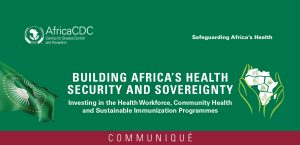Amid the ongoing mpox outbreak, new research is due to launch in the Democratic Republic of the Congo (DRC) to provide important real-world data on the performance of the LC16m8 mpox vaccine in African populations.
LC16m8 — a third-generation smallpox vaccine that is also used for mpox — is a live-attenuated vaccine produced by the Japanese manufacturer KM Biologics, a Meiji Group company. The vaccine has been licensed in Japan for decades against smallpox and has been used during previous mpox outbreaks, where it has been shown to be safe and effective, including in people with well-controlled HIV. The World Health Organization (WHO) granted Emergency Use Listing (EUL) for the LC16m8 mpox vaccine in 2024.
LC16m8 is now being rolled out for emergency use in the DRC, alongside another licensed mpox vaccine, in response to the outbreak. Three million doses of LC16m8 are being donated to the DRC by the Government of Japan to protect at-risk populations from the virus.
Mpox (formerly monkeypox) is a contagious infectious disease caused by the mpox virus, which is a member of the poxvirus family. There are two known clades of the mpox virus — clade I and clade II. Most people infected with mpox experience flu-like symptoms such as fever, headache, muscle aches, low energy, and swollen lymph nodes, as well as a skin rash featuring pus-filled lesions or blisters. In severe cases, it can be fatal.
“The vaccination campaign in the DRC provides us with a vital opportunity to gather insights into how effective the well-established LC16m8 vaccine is at preventing mpox disease in a high-transmission setting, including in children,” said Dr Richard Hatchett, CEO of the Coalition for Epidemic Preparedness Innovations (CEPI), which is funding the study.
“This could help guide how the vaccine can be used to have the greatest impact in the future. The research will also strengthen local scientists’ experience in rapidly generating real-world data during outbreaks, which could support faster and more efficient responses to future epidemic threats in the region,” he added.
Pending regulatory and ethics approvals and follow-up agreements for the study, an international research consortium will leverage the vaccination campaign to generate real-world evidence on the safety and effectiveness of the vaccine against mpox in affected populations in sub-Saharan Africa, including infants and children aged one year and above.
CEPI is providing up to USD 10.4 million to support the study, which is expected to launch before the end of 2025. The International Vaccine Institute (IVI) will serve as the study sponsor, while the Institut National pour la Recherche Biomédicale (INRB) in the DRC will act as co-sponsor. Supported by the DRC’s Ministry of Health and the Institut National de Santé Publique (INSP) — which regulates mpox outbreak research — the INRB will also assume the role of principal investigator, with the Japan Institute for Health Security (JIHS) as co-investigator.
“It is through scientific research with our different partners that we will be able to highlight the scientific evidence on the effectiveness of the LC16m8 vaccine against mpox. The results generated by this study will serve as an effective guide for future mpox outbreaks,” said Professor Jean-Jacques Muyembe, Director-General of the INRB and Principal Investigator.
A team of experts will assess the effectiveness of the LC16m8 vaccine by examining how many people become infected with mpox after being vaccinated in selected health zones considered hotspots for mpox cases in Équateur Province, north-western DRC. Additional data on the vaccine’s safety will be collected by monitoring a subset of participants taking part in the observational study.
The data generated are expected to inform vaccination and mpox management strategies in the DRC and other mpox-endemic regions, including, for example, the age groups that may benefit most from the vaccine and could be prioritised for vaccination. The findings could also provide evidence for policy and regulatory decisions on the use of LC16m8 in other countries.
The new research supports recommendations from the DRC’s Ministry of Health, the World Health Organization (WHO), and Africa CDC to prioritise the collection of additional data on the safety and performance of mpox vaccines during outbreaks.
“This study is a vital step in protecting Africa’s most vulnerable — especially children — from mpox. By turning science into action, we are building the evidence needed to guide vaccination and strengthen health security across the continent,” said Dr Jean Kaseya, Director-General of Africa CDC.
“The epidemiological data on mpox have enabled us to support the response with vaccination of the population. With this collaborative research, the DRC will be the first African country to collect essential field data on the use of the LC16m8 vaccine against mpox,” said Samuel Roger Kamba, Minister of Health of the DRC.
Dr Manabu Sumi, Director-General of the Department of Infectious Disease Prevention and Control at the Ministry of Health, Labour and Welfare of Japan, said that as the world’s only mpox vaccine currently approved for use in children, Japan’s LC16m8 has the capacity to help protect people of all ages.
“Building on the findings of this trial and Japan’s accumulated experience, the Ministry looks forward to working with international partners to further enhance LC16m8’s contribution to global preparedness and response efforts against mpox,” said Dr Sumi.
Africa CDC and the WHO declared the ongoing outbreak of mpox to be both a continental and global health emergency in August 2024. The WHO’s declaration of a Public Health Emergency of International Concern (PHEIC) was the second time in two years that mpox had been classified as an international emergency. As of September 2025, the WHO and Africa CDC confirmed that mpox remains a continental health emergency in Africa.







